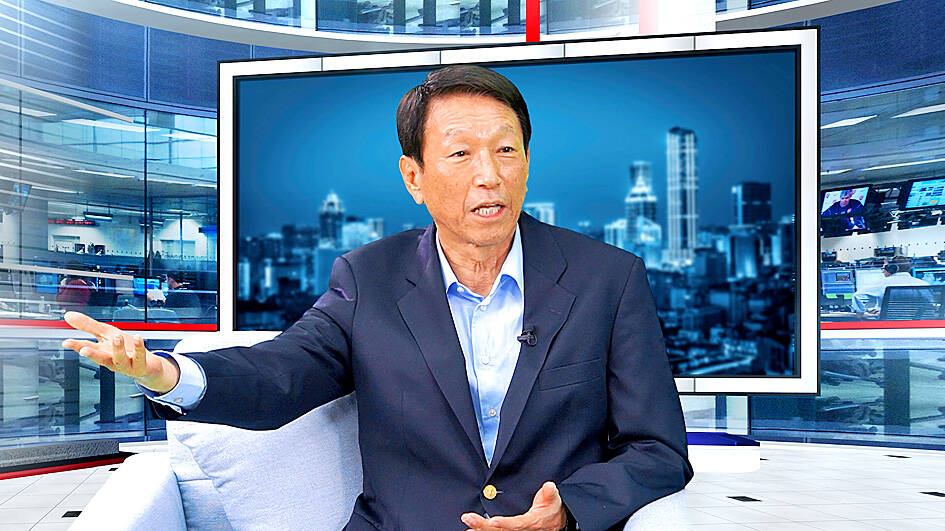Taiwanese must develop the resolve to work together to defend the nation, former chief of the general staff admiral Lee Hsi-ming (李喜明) said, while proposing a “homeland defense force” to provide small-arms training to the public.
The strategy would help discourage the Chinese Communist Party from attempting to invade Taiwan, Lee told the Liberty Times (the Taipei Times’ sister paper) in an interview published on Saturday.
Taiwanese generally have become more concerned about national defense and security after Russia’s invasion of Ukraine in February, he said, adding that Ukraine’s routing of the Russian military in its capital, Kyiv, and the recent start of its counteroffensive in eastern Ukraine show that asymmetric warfare can effectively counter an invasion.

Photo: Chang Chia-juei, Taipei Times
“What has impressed me most about Ukraine is that Ukrainians’ willingness to fight is greater than that of Russians,” he said.
“Taiwanese must overcome their ideological differences and show a willingness to unite in the defense of the country,” he added.
Lee said the persistence of the Taliban, and its indomitable will to fight, eventually resulted in pushing the US out of Afghanistan, which showed that it was possible to defend against a much more powerful military.
If the government provides drones, anti-armor rockets, grenades and other small arms to the general public during an invasion, along with training on how to use them, Taiwanese could help the military resist a Chinese attack, he said.
Statements from CIA Director William Burns and former head of the US Indo-Pacific Command admiral Philip Davidson that China would attempt an invasion of Taiwan by 2027 were “not opinions,” but based on assessments made on intelligence that should be taken seriously, Lee said.
Chinese President Xi Jinping (習近平) would want to fulfill ideas laid out in his vision of the “Chinese dream” before his expected third term ends in 2032, and part of that would include greater aggression by the Chinese military, Lee said.
“Taiwanese must not think about whether China will attempt invasion, but instead about when it will attempt to invade,” he said.
The government must start preparations by buying large numbers of smaller arms suitable for asymmetric warfare, which it appears to be doing, as it passed a special budget for the procurement of weapons systems that would enhance sea and air-combat capabilities, he said.
Despite the huge gap in defense resources across the Taiwan Strait, Taiwan could effectively defend itself if it aims not for air and sea control, but air and sea denial, he said.
Citing the US’ reform of its Marine Corps, which are transitioning from a focus on sustained land operations to be a naval expeditionary force, Lee said Taiwan’s military must anticipate defense needs and begin preparations as soon as possible.

Taiwan is projected to lose a working-age population of about 6.67 million people in two waves of retirement in the coming years, as the nation confronts accelerating demographic decline and a shortage of younger workers to take their place, the Ministry of the Interior said. Taiwan experienced its largest baby boom between 1958 and 1966, when the population grew by 3.78 million, followed by a second surge of 2.89 million between 1976 and 1982, ministry data showed. In 2023, the first of those baby boom generations — those born in the late 1950s and early 1960s — began to enter retirement, triggering

ECONOMIC BOOST: Should the more than 23 million people eligible for the NT$10,000 handouts spend them the same way as in 2023, GDP could rise 0.5 percent, an official said Universal cash handouts of NT$10,000 (US$330) are to be disbursed late next month at the earliest — including to permanent residents and foreign residents married to Taiwanese — pending legislative approval, the Ministry of Finance said yesterday. The Executive Yuan yesterday approved the Special Act for Strengthening Economic, Social and National Security Resilience in Response to International Circumstances (因應國際情勢強化經濟社會及民生國安韌性特別條例). The NT$550 billion special budget includes NT$236 billion for the cash handouts, plus an additional NT$20 billion set aside as reserve funds, expected to be used to support industries. Handouts might begin one month after the bill is promulgated and would be completed within

The National Development Council (NDC) yesterday unveiled details of new regulations that ease restrictions on foreigners working or living in Taiwan, as part of a bid to attract skilled workers from abroad. The regulations, which could go into effect in the first quarter of next year, stem from amendments to the Act for the Recruitment and Employment of Foreign Professionals (外國專業人才延攬及僱用法) passed by lawmakers on Aug. 29. Students categorized as “overseas compatriots” would be allowed to stay and work in Taiwan in the two years after their graduation without obtaining additional permits, doing away with the evaluation process that is currently required,

IMPORTANT BACKER: China seeks to expel US influence from the Indo-Pacific region and supplant Washington as the global leader, MAC Minister Chiu Chui-cheng said China is preparing for war to seize Taiwan, Mainland Affairs Council (MAC) Minister Chiu Chui-cheng (邱垂正) said in Washington on Friday, warning that Taiwan’s fall would trigger a regional “domino effect” endangering US security. In a speech titled “Maintaining the Peaceful and Stable Status Quo Across the Taiwan Strait is in Line with the Shared Interests of Taiwan and the United States,” Chiu said Taiwan’s strategic importance is “closely tied” to US interests. Geopolitically, Taiwan sits in a “core position” in the first island chain — an arc stretching from Japan, through Taiwan and the Philippines, to Borneo, which is shared by